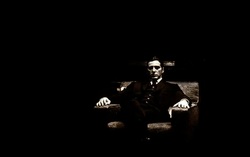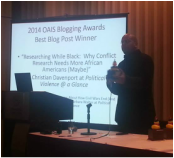
The meeting was set. We were picked up by Innocent and a rather well-built gentleman driving the car also named Innocent – I mentioned that this was a common name, no? Greetings were exchanged which took about 15 to 20 minutes and then we were off.
There was little chatter on the ride. All eyes moved in different directions but our minds were clear. We were going to meet one of the leaders of the largest Tutsi survivor organization: Ibuka. The group that formed shortly after the violence was completed -- bridging makeshift support groups, church organizations, NGOs and politically oriented individuals across Rwanda. Given the significance of the victimized group -- has told, they were the primary targets of violence in their numbers dwindled to basically nothing in the short time of it because they were killed but they had to flee.
After driving for quite a while we pulled up to a wall. The driver signaled to some guy with a machine gun, who in turn signaled to another individual in the metal gate retracted -- slowly and loudly. Once the door was open enough, the car pulled in -- revealing about 5 to 6 armed guards, several trucks and about a dozen people mulling about. No one pays any attention.
Out of the car, we walked up some stairs, through a door, down the corridor and up into another area. Here the guard stopped. Innocent, the first one, walked in with us and he then sent down -- gesturing that we should join them. The anticipation was immense: what is the leader of a Tutsi survivor organization like? What was he before the killing? What is he now?
I don't know who I expected to walk in but it was not the man who came through the door. He was small, old, meek and with a set of front teeth that could best be described as a free-for-all. Catching myself it occurred to me that perhaps America warps one's sense of leadership. The men had no suit, no manicure, no hairdo, seemingly no charisma at all - at least by my as yet unidentified but evidently existing standards. That said, he was one of the leaders of the organization so there must have been something there. Perhaps I just couldn't see it. After lightly shaking our hands, he sat down, the back of the chair seemingly swallowing him as he crouched into it.
Jumping right in, he told us of the beginning of his organization. There were hundreds of small groups all over he said. One by one we started bringing them together, giving us our voice. He then spoke of the current government. Smiling devilishly he said, “we disagree on a great many things but they have made great strides.” All the while Innocent, the first one, sat there obedient, quiet -- I've not seen him this way previously. Normally he had such a commanding, powerful presence. In front of us. However, now he was a different individual entirely. It made me think of some of the ministers of the Nation of Islam on their own as opposed to being in front of Farrakhan or some other leader. No smiles, no bow ties, no side conversation, just nods of approval and looks of seriousness. Every now and then a guy with a machine gun would show up to inquire about beverages and refills. We always said no. No need to bring him back too much, I thought.
The leader then spoke of the government efforts at truth and reconciliation – Gacaca. “These are flawed, very naïve strategies” he began. “There were not even created with such grave activities in mind -- historically. They were community level courts that address small grievances like theft or property violations. How do you go from one to the next? How do you go from stealing a chicken to killing family? Very poorly,” he said. “Very poorly. We watch all of these things. But quantum. Talk to the government about our concerns. Write about them. We have hope that there is a way to go.”
“And what is it that you wish to do,” he said to me, almost shocking me with his return to a two-way conversation. I started to explain but shortly into our conversation he began to say that “it is important -- your work. The truth must be known. If we can help, we are more than willing to do so.” He gestured to Innocent, the first one, identifying him as a useful collaborator. We then chimed in that we would like to take the study that they conducted in Kibuye (a house by house survey of who was left and how individuals died) and replicate that throughout the country. He had clearly been told about our interest and smiled, crookedly. “Yes, that would be nice.” Quickly he added, “but be careful though.” At saying this, he stood, walked to a bookshelf, pulled out a book and put it in front of us. “This person sought the truth. They provide one of the most thorough investigations of what happened in the relevant commune. Very good. Very good work.” Looking at his watch and beginning to move toward the door, he said both quickly and directly, “the author died – unfortunately. Be careful.”
With that, innocence stood (the concept not the man), the door opened, we were escorted out and driven back to the Milles Collines by a different driver – we did not get his name either. Sitting down in the car, Al (Stam) and I looked at one another and looked out the window. We did not speak. After we got out and wave goodbye, we went in to get a drink but ended up having about three. We were not exactly sure why we needed one know what happened at the meeting but we felt that after meeting the godfather of survival one needed to toast one’s own.

 RSS Feed
RSS Feed
